Best Fifa Football awards 2020: How Robert Lewandowski faced adversity in journey to top
- Published
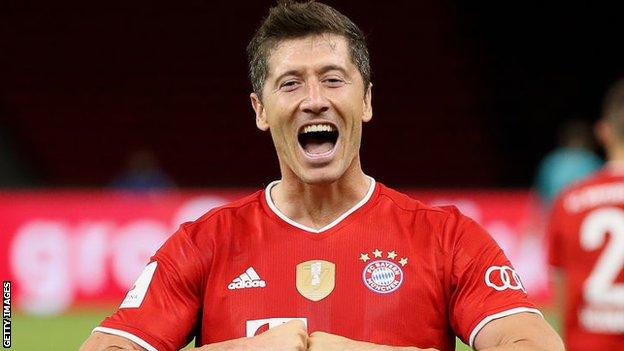
Robert Lewandowski has scored 177 goals in 201 Bundesliga appearances for Bayern Munich
Robert Lewandowski did not hide his disappointment, external when the 2020 Ballon d'Or award was cancelled because of coronavirus but now, having won the top men's prize at the Fifa Best awards, he finally has his moment.
Lewandowski always looked like the obvious choice to come out on top from a shortlist also featuring Lionel Messi and Cristiano Ronaldo.
How could he not? His case was compelling. He scored 55 goals in 47 games last season and finished as top goalscorer in three competitions: the Bundesliga, German Cup and Champions League. Bayern won the treble, added triumphs in the Uefa Super Cup and German Supercup, and the striker was at the heart of it all.
But while nobody doubts his quality now, the 32-year-old Pole was not always destined for the top. As a teenager, it seemed a distinct possibility he would not make it as a professional at all.
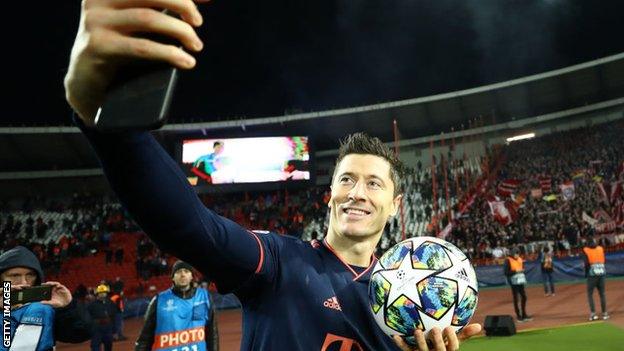
Only Lionel Messi (118) and Cristiano Ronaldo (134) have more Champions League goals than Lewandowski's 71

Life was tough for a 17-year-old Lewandowski in 2005 when his dad Krzysztof, a European junior champion in judo, died.
Robert had just moved from Delta Warsaw, a small fourth division team, to Legia, one of the best clubs in the country and winners of 14 league titles.
It was supposed to be a major stepping stone in his career and Lewandowski slowly became a regular in Legia's reserves, but a knee injury stopped his progress in its tracks.
While he was out for a few weeks, Legia made their decision. Lewandowski was not in their future plans any more. At the time, Legia thought they had better strikers and told him to leave.
After he found out, his mum, Iwona, drove him home and made him dinner. But with his professional dream apparently shattered, Lewandowski did not want to eat.
Fortunately, he took a call from third division team Znicz Pruszkow. The club always relied on buying players for little money, improving them and selling them on. As Znicz's former president Marek Sliwinski put it,, external Lewandowski was their "goldfish". They paid just £1,000 to buy him from Legia.
At the start, he was far from being Znicz's biggest star. He earned around £230 per month and there were squad members who were paid three times as much. However, he quickly established himself. He had found a home.
In his first season, he scored 15 goals and helped Pruszkow to promotion. He continued scoring in the second division, too.
In December 2007 Jacek Grembocki took over as coach. "Pruszkow had a decent team and five players from that team made it to the Ekstraklasa [Poland's top flight]," Grembocki tells BBC Sport. "But, of course, Lewandowski was a mega talent. He had everything: he was hard-working, technical and fast.
"After that knee injury, I think he realised there was no chance at Legia. So in order to become a pro, he had to work hard. And Pruszkow got their superstar."
After two months, Grembocki became convinced: "We played a friendly game against LKS Lodz, an Ekstraklasa side," he says. "He was put against experienced Croatian defender Ivan Udarevic. Robert was the best player on the pitch.
"I played seven games for Poland, so I thought it would not be a problem for him to get into the national team. But of course, Bayern? Oh, that would be tough. Now, Lewandowski is the best player in Europe. He gave me a lot of joy.
"Legia made a big mistake. They considered him to be pretty good, but they thought they had better strikers. I coached Lewandowski for two months and saw he could become a player for the national team. In Legia, nobody saw it."
Thanks to Lewandowski's goals (21 in total) under Grembocki, Pruszkow became a surprise contender to reach the top flight. In the end, they narrowly missed out on promotion, as they claimed only one point from their last three games. However, it was clear Lewandowski had all it took to play in the top flight and a lot of Ekstraklasa clubs showed their interest.

In 2008, Legia got their second chance. They missed out on Lewandowski again, though. They wanted to strengthen the striker position, but chose Mikel Arruabarrena from CD Tenerife over Lewandowski.
While Arruabarrena never scored for Legia, Lewandowski became a star at Lech Poznan, Legia's rival. Lech paid around £300,000 to Pruszkow.
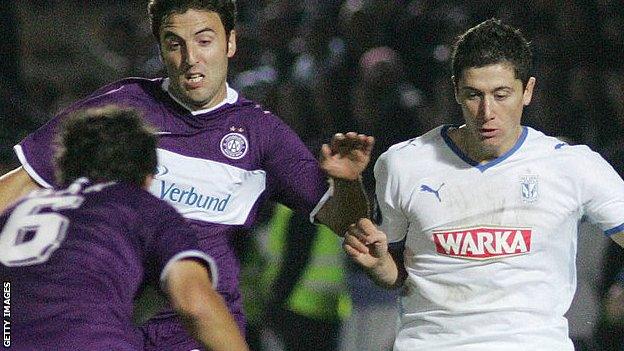
Lewandowski scored 41 goals in 82 games for Lech Poznan
Bartosz Bosacki was Lech's captain at that time. "I remember his first training session," he says. "After it, every player thought he was good. In the training game, he played against our Colombian defender Manuel Arboleda, one of the strongest men in Ekstraklasa. Robert was not afraid, though.
"When we look at Robert nowadays, he is an athletic man. However, back then he was thinner, so a lot of people thought he might have a problem in Ekstraklasa physically. After that training session, we knew he would be good."
Lewandowski had strong competition for the number nine position in Peruvian striker Hernan Rengifo. "If the coach Franciszek Smuda played Robert, he chose him as a left or right midfielder. But a few months later, the next coach Jacek Zielinski started playing him as a centre-forward and Robert became very effective," Bosacki explains.
In the 2009-10 season, Lewandowski scored 18 goals as he led Lech to the league title. "When he first came into the dressing room, he was quiet, but at the same time very confident when he played. He was always the guy who knew what he wanted," adds Bosacki.
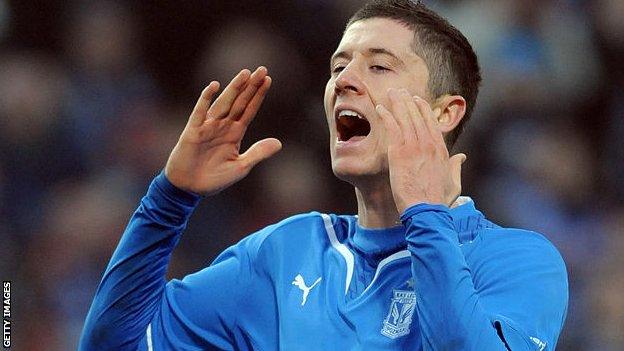
Lewandowski was the top scorer in the 2009-10 Polish top flight
Poland manager Leo Beenhakker called him up and gave him his international debut against San Marino. Perhaps inevitably, he scored.
Bosacki remembers one of Poland's training sessions. "I played against Robert and I had a big problem defending against him. After training I spoke with Beenhakker and he told me: 'He is good'. I answered: 'I am happy I play with him in the same team!'"
After two years at Poznan, Lewandowski was destined for a big move abroad. Blackburn Rovers were one of the clubs thought to be interested. However, he never travelled to England to negotiate as Eyjafjallajokull, the Icelandic volcano, erupted and stopped flights around Europe. In the end, Borussia Dortmund bought him for less than £4.5m.
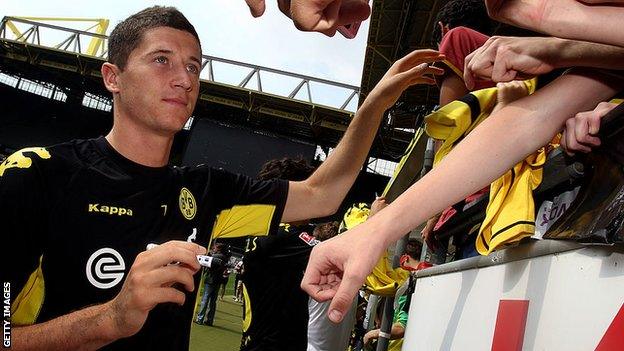
Lewandowski scored 103 goals for Dortmund in four years at the club
At Dortmund, he faced a similar problem as at Lech. Paraguayan striker Lucas Barrios was Jurgen Klopp's preferred choice for the main striking role, so Lewandowski had to play out of position. After Klopp shifted him to the centre of the attack, Lewandowski became the team's star. "Everything changed in Dortmund - that was a very important move for him," Bosacki says.
He has never looked back since. He scored four against Real Madrid in the 2012-13 Champions League semi-final and one year later moved to Bayern Munich, where his achievements include scoring five goals in nine minutes in a league game against Wolfsburg in 2015.
"He put a lot of work in and had the support of a great family and wife. Players like Lewandowski only think about one thing: success, success and success. Now, he plays not only for Poland, but for Bayern, too. And he is a legend, up there with Messi and Ronaldo," Grembocki adds.
Lewandowski has 116 caps and 63 goals for his national team. "He is the best player in the history of Polish football," says Grembocki.
And now, at last, he has cemented his place among the game's greats.
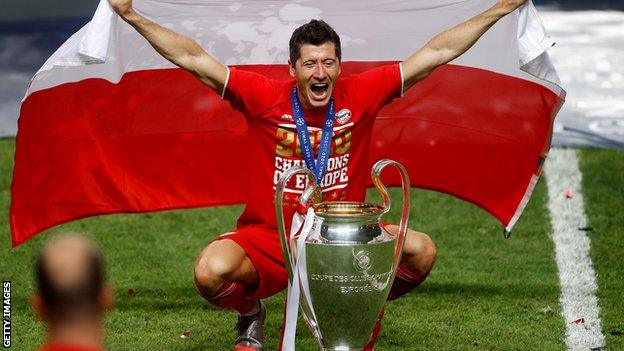
Lewandowski is just the sixth player from Poland to win the European Cup or Champions League